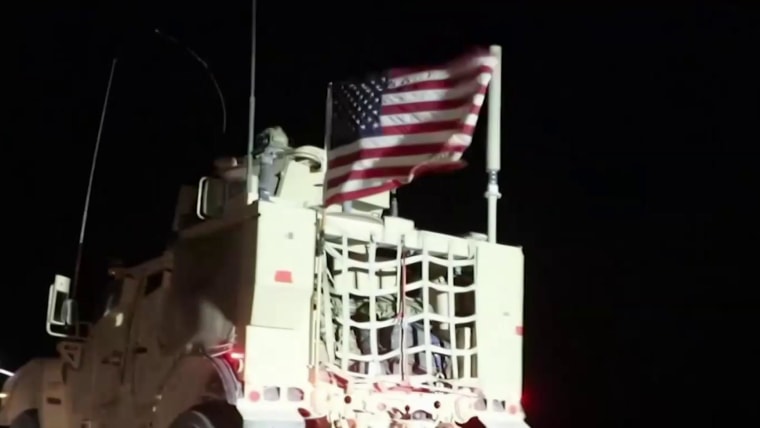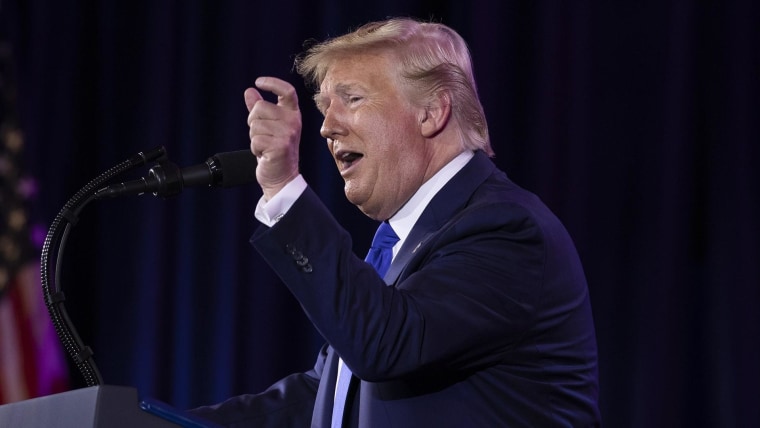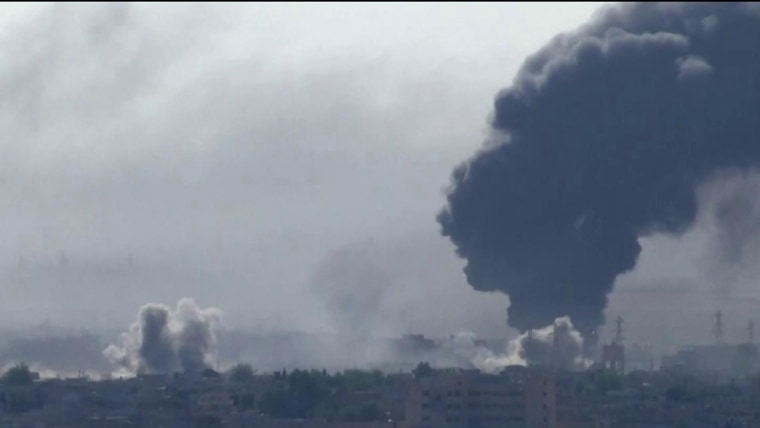The U.S. military this weekend accelerated its plans to fully withdraw from Syria as Turkish forces continued their advance in the country's north and reports of human rights atrocities emerged.
About 1,000 troops will leave the area "as safely and quickly as possible," Defense Secretary Mark Esper told CBS' "Face the Nation" in an interview Sunday. President Donald Trump late Saturday signed off on the order, which would end most of the U.S. military's presence there, two U.S. military officials in the region told NBC News. Only around 300 soldiers would remain in the U.S. military's Al Tanf base in the south, the officials said.
The order, which has not been carried out yet, came as the Turkish military escalated its military operation in the region, driving the area into further instability.
Syrian government troops were set to deploy along the border with Turkey to help Kurdish fighters fend off the invasion, while hundreds of Islamic State group supporters escaped from a displacement camp earlier Sunday.
Esper said that the spiraling conflict had become "untenable" for the U.S. military.
U.S. forces were at risk of being isolated and there was increased risk of confrontation between Turkish forces and U.S. troops, said an official who asked to remain anonymous because they were not authorized to speak publicly.
U.S. officials told NBC News that the decision to move troops out was largely because Turkish military and proxy forces had set up more checkpoints on the crucial M4 Highway, cutting off the U.S. military's ability to move safely in the northeast and without coming into contact with the Turkish forces or their proxies.
The officials said it was increasingly clear that the Turkish forces were trying to drive the Americans away.
'Chaos in the camp'
Trump has largely stood by his decision to pull U.S. troops back to clear the way for Turkish forces, despite growing chaos in the wake of their advance.
U.S. allies have urged an end to the Turkish invasion, which has sparked fears of a renewed humanitarian crisis in the region and a resurgent ISIS threat.
Trump said Sunday that it was "very smart not to be involved in the intense fighting along the Turkish Border, for a change."
The president added that he was working with Congress on imposing "powerful sanctions on Turkey."
The U.S. previously set down red lines for the Turkish offensive that would trigger economic sanctions, including ethnic cleansing and indiscriminate fire directed at civilian populations.
The Kurdish-led Syrian Democratic Forces (SDF) and Syrian Observatory for Human Rights said Sunday that close to 800 members of a camp holding the families of ISIS fighters had escaped after Turkish shelling.
Some Kurdish guards were forced to leave their posts as fighting neared a camp for displaced people near the town of Ain Eissa, a spokesperson for the U.K.-based observatory told NBC News.
"It’s now chaos in the camp and there are people still escaping," Rami Abdulrahman said early Sunday.
NBC News has been unable to independently verify the claim.
The Turkish military and Turkey-backed Syrian fighters continued to advance toward Ain Eissa, the administrative center of the Kurdish-held areas.
As they drove forward, video and photographs appearing to show alleged atrocities carried out by Turkish-backed fighters spread on social media.
Multiple U.S. officials told NBC News the video, which appeared to show the execution of a Kurd, appeared to be genuine.
The video is disturbing and NBC News has blurred the most graphic images.
The Syrian Observatory for Human Rights also claimed some civilians had been executed. NBC News has been unable to independently verify the claim.
A State Department official told NBC News that "We find these reports to be extremely troubling, reflecting the overall destabilization of northeast Syria."
"We condemn in the strongest of terms any mistreatment and extrajudicial execution of civilians or prisoners, and are looking further into these circumstances," the official added.
U.S. allies in Europe sought to step up the pressure on Turkey, with both Germany and France saying they would halt weapons exports to Ankara.
British Prime Minister Boris Johnson expressed "grave concern about Turkey’s military operation" in a call with Turkish President Recep Tayyip Erdogan Saturday, his government said.
Protests in support of the Kurds were held in Greece, Germany and France Saturday. Demonstrators also gathered outside the White House holding large Kurdistan flags.
ISIS resurgence?
Former Defense Secretary James Mattis, who led the Pentagon through the first two years of the Trump administration, warned during an exclusive interview with NBC's "Meet the Press" Saturday that the president's decision to pull troops from Syria's border in advance of a Turkish incursion could have dire consequences and lead to ISIS's resurgence.
"There will be serious consequences for our national security well beyond Syria," said Brett McGurk, former special presidential envoy for the global coalition to defeat ISIS and NBC News foreign affairs analyst, in response to news of U.S. troops leaving northern Syria.
"For now, may our people get out safely."
Asked Sunday whether he thought Turkey, a NATO ally, would deliberately attack American troops in Syria, Esper said, “I don’t know whether they would or wouldn’t.”
U.S. troops stationed in the region came under artillery fire from Turkish forces late Friday, but no Americans were injured in the incident.
World leaders and aid organizations have warned the offensive could lead to a new humanitarian crisis on the ground.
The United Nations said Sunday that more than 130,000 people have been displaced from rural areas around the strategically key northeastern Syrian border towns of Tel Abyad and Ras al-Ayn as a result of fighting between Turkish-led forces and Kurdish militia.
It estimated up to 400,000 civilians in the Syrian conflict zone may require aid and protection.
The Trump administration also released $50 million in assistance to Syria late Saturday "to protect persecuted ethnic and religious minorities," according to a statement from White House Press Secretary Stephanie Grisham.
Turkish troops are fighting the Syrian Democratic Forces, which are led by the Kurdish People's Protection Units (YPG). Turkey views the YPG as an extension of the separatist Kurdistan Workers’ Party (PKK), which is considered a terrorist group by the United States.
But the Kurdish-led Syrian Democratic Forces have been crucial U.S. allies in the war on ISIS.
The SDF has held more than 10,000 ISIS members in detention centers and prison camps, but they said they are being forced to abandon some of those positions to fight the Turkish invasion.
Turkey’s defense ministry said Sunday that 480 “terrorists” have been killed since launching its military operation. That claim has not been independently verified by NBC News.
The number of casualties since the violence began has varied between sources and NBC News has been unable to independently verify any claims.






